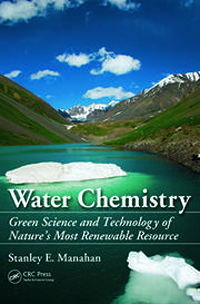Water Chemistry Green Science and Technology of Nature's Most Renewable Resource
Material type: TextLanguage: English Publication details: Boca Raton, FL: CRC Press, c 2011Description: XVII, 387 P. : illISBN:
TextLanguage: English Publication details: Boca Raton, FL: CRC Press, c 2011Description: XVII, 387 P. : illISBN: - 9781439830680
- 628 MAN
| Item type | Current library | Collection | Shelving location | Call number | Copy number | Status | Date due | Barcode |
|---|---|---|---|---|---|---|---|---|
 Reference Collection
Reference Collection
|
Reference Section | Department of Chemistry | Reference Section | 628 MAN | 2024-2025 | Available | 98834 |
Summary:
Carefully crafted to provide a comprehensive overview of the chemistry of water in the environment, Water Chemistry: Green Science and Technology of Nature's Most Renewable Resource examines water issues within the broad framework of sustainability, an issue of increasing importance as the demands of Earth’s human population threaten to overwhelm the planet’s carrying capacity. Renowned environmental author Stanley Manahan provides more than just basic coverage of the chemistry of water. He relates the science and technology of this amazing substance to areas essential to sustainability science, including environmental and green chemistry, industrial ecology, and green (sustainable) science and technology. The inclusion of a separate chapter that comprehensively covers energy, including renewable and emerging sources, sets this book a part.
Manahan explains how the hydrosphere relates to the geosphere, atmosphere, biosphere, and anthrosphere. His approach views Planet Earth as consisting of these five mutually interacting spheres. He covers biogeochemical cycles and the essential role of water in these basic cycles of materials. He also defines environmental chemistry and green chemistry, emphasizing water’s role in the practice of each. Manahan highlights the role of the anthrosphere, that part of the environment constructed and operated by humans. He underscores its overwhelming influence on the environment and its pervasive effects on the hydrosphere. He also covers the essential role that water plays in the sustainable operation of the anthrosphere and how it can be maintained in a manner that will enable it to operate in harmony with the environment for generations to come.
Written at an intermediate level, this is an appropriate text for the study of current affairs in environmental chemistry. It provides a review and grounding in basic and organic chemistry for those students who need it and also fills a niche for an aquatic chemistry book that relates the hydrosphere to the four other environmental spheres.
